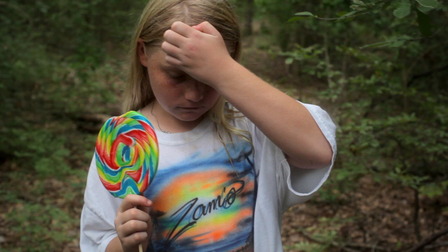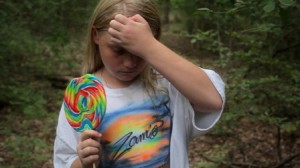Kid-Thing and interview with director David Zellner | Berlin Film Festival 2012

After numerous short films, music videos and their full-feature debut Goliath (2008), brothers David and Nathan Zellners present us their new disturbing, brutal, offbeat, melancholy and wrong-kind-of-funny feature Kid-Thing, participating in Forum program of 62nd Berlinale.
Annie, 10-year-old, lives in Austin on a remote goat farm with her dad (Nathan Zellner), who seems to be very much like a child himself spending his days wasting time with his friend Caleb (David Zellner). Annie is a ‘rough diamond’ – her peers think she’s a brat and refuse to play with her, so the little rebel is left alone to roam the streets and forests, inventing games for herself and leaving a trail of destruction in her path.
One day, Annie stumbles across the hole in the ground from whose depths a woman’s voice can be heard calling for help. A strange relationship develops between the two, as Annie keeps coming back to this mysterious place bringing sandwiches and walkie-talkies.
Kid-Thing is grotesque and violent – it shows how harsh can a childhood be for a destructive girl whom no one likes, loves and takes care of. At the same time, it does not put on a pretentious serious face and ask us to be sorry for Annie but instead allows us to marvel at her imagination and follow every step of her expeditions, giving insights into the complex mind of this little child.
A young newcomer Sydney Aguirre with her incredibly skilful performance in every long take and strong (even if slightly awkward) presence on screen manages to grab and hold our attention throughout the whole film, and the voice of Susan Tyrrell (playing Esther, the woman in the whole) adds a funny fairytale-like twist to the constructed reality. Kid-Thing is very profound, yet it should not be taken seriously – you will catch yourself laughing at the most uncomfortable instances.
Verdict: ••••
Nathan and David gave an exclusive interview for The Upcoming right after the premiere, where they analyse the main themes they explored in the picture. Actually only David spoke – Nathan kept staring at him. Here it is:
Both of your characters in the film are very bizarre and hard to figure out. How did you work on them to construct them the way they turned out?
David Zellner (DZ): We kind of grew up in that area [Austin, Texas] so we were surrounded by certain people who had similar qualities to the characters. We took those traits and magnified them for the purpose of the film. They also seem like a good counterpoint to the character of Annie; her father is not curious at all and has kind of given up on things, and he’s supposed to be an authority figure, some source of stability, a moral compass, but he’s just unable to operate in that way. We didn’t want him to be disappointing or abusive or anything like that – that would be an easy thing to do, a kind of cliché that would explain why Annie does everything she does – so we made him more passive. He’s doing the best he can as a father, but the best he can is lousy and ineffective. And then we wanted Annie to be as much in control of her actions, and not necessarily blame it on other people.
Because there are not any other people in the film…
[Nathan laughs, so you know he’s there]
DZ: Yeah, the film is very much focused on her decision making. Kids of that age are just trying to figure things out on their own, they’re pushing boundaries, so we removed all the road-blocks for this character in terms of parental guidance or adult supervision. She’s left to wander and stumble and do everything on her own.
I thought the facts that she is lonely and that other kids rejected her were emphasized in the film…
DZ: Yes, she’s very lonely, her peers aren’t kids she can relate to, or rely on. It also functions on a multi-layered level, because Annie has problems relating to people around her, and you never know how much of it is her fault. And her father figure – he’s present but completely absent at the same time.
He is there precisely to be shown as absent.
DZ: Exactly. And he’s got nothing to offer to her. So there’s all these levels of isolation that Annie is dealing with, that I think all people can relate to, to a certain level, and then we obviously amplified it for the purposes of the film.
Can you personally relate to the character as well? Is Annie’s childhood anything similar to the way you grew up?
DZ: Our childhood was very different from that one. We had a good relationship with our parents. But I can definitely relate to the periods of loneliness and confusion you have as a child. We wanted the film to be from her perspective rather than anyone else’s, got rid of all sentimentalities, because when you’re a child, you’re not really sentimental – you do all these horrible things, and everything is fresh and new, and you don’t know what happens next or when is all this going to end. Kids also have an internal logic different from that of an adult in terms of problem solving, so that was very interesting to explore as well.
Let’s talk about the character of Esther. Was the voice her own interpretation, or did you work it through together?
DZ: Susan Tyrrell is one of our favourite actresses, so this performance is very much kind of her thing – she has an interesting voice, within one sentence she can be terrifying, happy and sad. It was a very interesting vernacular for us, so we sat down and discussed the impact we wanted her voice to achieve, and then we kind of let her loose.
The whole movie overall reminded me of Terry Gilliam’s Tideland or Fantastic Mister Fox – those are also from children’s perspective. It also links with works of other independent American filmmakers – the mood is similar to that in Miranda July’s movies, and the aesthetics reminded Harmony Korine. Do you draw any inspiration from other films or filmmakers?
DZ: We both are big fans of Harmony Korine! And I love watching movies as much as making them, so tons were brought from them. But we did not draw inspiration from anything in particular while we were filming; only once we’d finished, we thought of other great child performances, since that is what we wanted for our film. The best is 400 Blows, but Kes by Ken Loach is definitely one of my favourite ones. Also, all the stuff that Linda Manz acted in – she was the little girl in Days of Heaven, and Out of the Blue, all really good performances. Also Mouchette by Robert Bresson, about a girl who is going through tough times in the countryside – this type of films were very inspiring for us.
So if was very much about child acting and the child’s perspective, wasn’t it?
DZ: Yeah. We wanted to make a film about this particular childhood, and to do it without adult’s censorship, sentimentalising and interpretation of the way they think it should be. Things like holes in the ground can instantly become something mysterious. And we wanted to set a melancholic tone that would fit her sensibility. We also grew up on literature that was almost a hundred years older – pretty much books we picked up at school’s library, fairy-tales and mythology that were sophisticated in their subject matter – and it was much darker and more interesting than contemporary children’s literature, which is I feel very dumbed- and watered-down. We wanted to explore this dark and grotesque subject matter and mix it with the elements of a fable.
Last question – what is your upcoming project? Do you have any plans for the future?
[Nathan laughs again]
DZ: We have one project, yes, but it is still up in the air and we’re not allowed to talk about it yet. But we have lots of thing we want to do, and of various sizes as well – smaller personal projects, and bigger scale full features. Playing with genre would also be interesting. If we are going to spend a couple years of our lives on a film – we will take something that, at least to us, is new, fresh and challenging. I can’t think of anything worse than being trapped in one genre. I guess if it’s a job then it makes sense…
Is filmmaking really a job though?
[Nathan laughs]
DZ: No, you’re right, there are better ways to make money!
Ruta Buciunaite



















Facebook
Twitter
Instagram
YouTube
RSS